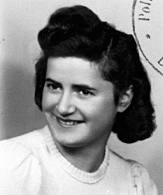
Regina Gutman
Born: May 12, 1926
Radom, Poland
Regina was born in Radom, a city that had 120,000 inhabitants. Her father worked as a leather cutter for a large shoe manufacturer and her mother took care of their six children. The Gutmans were very religious and Regina attended Hebrew school in the afternoons. Radom had a vibrant Jewish community of some 30,000 people, several Yiddish daily newspapers, and beautiful synagogues.
1933–39: On September 1, 1939, the German army invaded Poland, and seven days later, Radom was occupied. Soon afterward, the Nazis began to implement anti-Jewish policies there. Regina and her family's lives were dramatically changed. The German authorities closed the Jewish schools and confiscated radios and all valuables, including furs and jewelry. In the Gutmans' neighborhood, Jews created special classes to teach young children to read and write. In December, German officials in Radom appointed a Jewish council and police force.
1940–45: In 1941 German authorities ordered all Jews in Radom to move into the newly created ghetto. The Gutmans were forced to live in one small room. Conditions inside the ghetto were poor. Overcrowding, hunger, and disease were commonplace. Regina's parents decided to smuggle her out of the ghetto by bribing one of the guards. She escaped to Pionki, where an older sister lived, but was soon conscripted for forced labor in the town's munitions factory. There she formed a close friendship with Sam Spiegel, a fellow inmate. In fall 1944, Regina, along with the other camp prisoners, was deported to Auschwitz.
Regina was transferred to several other camps for forced labor. In April 1945, Regina was liberated by Soviet troops. After the war, she learned that her sisters, two brothers, and parents had perished. Regina and Sam reunited and later married in the Foehrenwald displaced persons camp in Bavaria.

